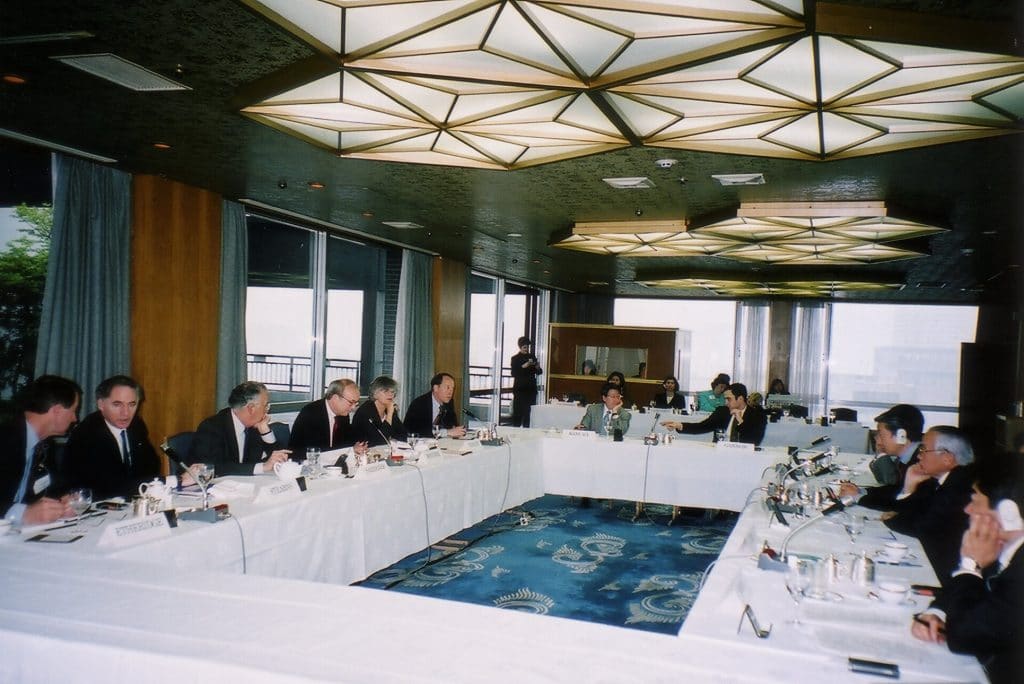The seven participants in the 2002 US Congressional Exchange Program departed Washington DC, on February 17 and arrived in Tokyo the following day to begin a whirlwind tour of the world of Japanese politics and economics. The program brought them together with top politicians, cabinet officials, high-ranking diplomats and bureaucrats, and the leadership of most of Japan’s major political parties. In addition to learning about the general state and practice of politics and policymaking in Japan, the delegates took advantage of their opportunity to explore issues such as the changing nature of Japanese politics and governance, prospects for economic reform, and the future direction of US-Japan relations—particularly in the post-September 11 context.
This delegation was organized by the Japan Center for International Exchange (JCIE) as part of its Political Exchange Program, one of the three major components of JCIE’s activities. In 1968, JCIE established the US-Japan Parliamentary Exchange Program, which is now the longest-running nongovernmental and nonpartisan exchange program between members of the US Congress and the Japanese Diet. To complement this program, JCIE established the US Congressional Staff Exchange Program in 1982 in recognition of the vital role Congressional staff members play in the legislative and policymaking processes. This one-week program is designed to provide senior staff members the opportunity to meet with Japanese legislators and policymakers and thus give them a sense of the Japanese policymaking process as well as political, economic, and social trends. It also affords the delegation an occasion to discuss issues of mutual interest in US-Japan relations, particularly security and trade issues. In the program’s 20-year history, 127 staffers serving Congressional members from both parties have visited Japan, bringing their heightened understanding of the US-Japan relationship and the politics of Japanese policymaking back to the US Congress.
The 2002 delegation’s visit was particularly timely. It took place as Prime Minister Junichiro Koizumi was faced with the first political crisis of his administration. He suffered a 30-point dive in his approval ratings that was widely seen as the most serious blow yet to the prime minister, a leader whose main pillar of strength has long been strong public support. Second, the visit came in the wake of September 11, as the US Congress and policymakers around the world struggle to reshape the international order and seek effective methods to combat terrorism at home and abroad. In Japan, the attacks sparked the remarkably rapid passage of the Anti-Terrorism Special Measures Law in October 2001, which significantly expanded security cooperation with the international community. Third, the visit coincided with President George W. Bush’s first visit to Japan since September 11, a visit that cast a spotlight on Japan’s regional and global security role and fed the fires of the national debate over the lengths to which Japan should go to support the United States in its “war on terrorism.” Finally, the visit came as fears of a Japanese financial crisis began to register with policymakers around the world, leading many to speculate about the global dangers of further economic deterioration, and squarely positioning the problem of Japan’s economic stagnation as one of the central issues of the US-Japan bilateral relationship.
Participants
Deana Funderburk, Policy Assistant to Majority Whip Tom DeLay (R-TX)
Mandy Kenney, Deputy Legislative Director to Rep. Mike Thompson (D-CA)
Brian MacDonald, Chief of Staff to Rep. Greg Walden (R-OR)
Erik Raven, Legislative Assistant to Sen. Robert Byrd (D-WV)
Ron Reese, Director of External Affairs to Chairman John Boehner (R-OH)
Todd Rosenblum, Legislative Assistant to Sen. Evan Bayhn (D-IN)
Lawrence Willcox, Tax Counsel to Sen. Jon Kyl (R-AZ)
Summary of Discussions
Shifting Political Winds and a Growing Focus on Policy
In their five days in Tokyo, the delegates met with 12 Diet members and the leadership of the three largest political parties—Nobutaka Machimura, acting secretary-general of the ruling Liberal Democratic Party (LDP); Otohiko Endo, chair of the International Affairs Council for the New Komeito Party, the LDP’s main coalition partner; and Yukio Hatoyama, president of the Democratic Party of Japan (DPJ), the largest opposition party—each of whom outlined their party’s views on a variety of issues and gave the Congressional staffers insights into the nuances of coalition politics. These offered a unique perspective on the current state of Japan’s politics, making it clear that politicians are becoming increasingly vocal in expressing their disenchantment with the current administration in the wake of Koizumi’s controversial dismissal of his foreign minister, Makiko Tanaka. In meetings with the staffers, opposition party members lambasted Koizumi’s shift towards the conservative, anti-reform wing of the LDP. Meanwhile, even some of Koizumi’s most ardent supporters admitted that it would be nearly impossible for the prime minister’s public support to recover to its previously high levels, and they expressed their diminished hopes that he could succeed in implementing even one or two of the many major reforms he has proposed.
The Diet members and the delegates also spoke in depth about the intersection of politics and policymaking. Yoshimasa Hayashi (LDP) and Tsuyoshi Yamaguchi (Independent) related the frustrations and successes they have encountered in their efforts to expand their role in the policymaking process. Meanwhile, Yasuhisa Shiozaki (LDP) told the delegates how political conflicts are shaping economic policymaking, and Masami Tashiro, Senior Director for International Affairs of the Japan Institute for Social and Economic Affairs, spoke about the role of corporations in Japanese politics.
A number of Diet members noted that there is a growing tendency among politicians to pay greater attention to substantive policy issues, and reactions to this trend underpinned many of the discussions. Several insisted that voters are becoming increasingly concerned with policy issues rather than party affiliation or local ties, and that this is what has driven their elected representatives’ interest in policymaking. One of the speakers explained how this is affecting party politics, arguing that the absence of major policy differences between the DPJ and the LDP makes them appear to be different sides of the same party and creates a core weakness for the DPJ. Another expanded upon this analysis, noting that the deep public hunger for change is raising the likelihood of a major party realignment along more natural policy lines.
Economic Reforms and the Nonperforming Loan Problem
After hearing from political leaders how economic reform and economic recovery are the most critical issues facing Japan, the delegates received briefings on the background and current state of reform efforts from Shijuro Ogata, former deputy governor of the Bank of Japan; Kazumasa Iwata, director-general of the Economic Assessment and Policy Analysis Division of the Cabinet Office; and politicians such as Yasuhisa Shiozaki, an LDP member of the House of Representatives. In addition, Hidehiko Nishiyama, director of the Americas Division for the Ministry of Economy, Trade, and Industry (METI), spoke with them about Japan’s trade policy and outlined the main issues in US-Japan trade relations.
Shijuro Ogata began his briefing on the prospects for structural economic reform by listing up Japan’s “three decliners”—declining equity prices, declining consumer prices, and the declining yen. Many analysts and pundits have identified these as symptoms of deeper problems that necessitate a spate of structural reforms: financial reform to halt the rise in nonperforming loans (NPLs), fiscal reform to spark an economic recovery, administrative reform to stimulate private sector activity, and political reform to overcome opposition from interest groups and their political allies to the necessary economic reforms.
While several of the politicians and economic experts raised the need for comprehensive and simultaneous reforms, the minds of most policymakers were focused on the more urgent issue of NPLs. Members of the New Komeito revealed that one of their main strategies for differentiating themselves from the LDP will be to call for the resolution of the NPL problem in one year through the injection of public funds into financial institutions. Meanwhile, opposition party members hammered the LDP for colluding with bureaucrats and the big banks to delay the resolution of the NPL crisis. Government representatives explained to the delegates that the Koizumi administration was making strong efforts to combat the NPL problem by increasing the monetary base at a torrid 23 percent annual rate to counteract the tendency of deflation to push problem loans into the non-performing category. Still, it became clear that there are pitched battles underway within the LDP, the Cabinet, and the Financial Services Agency (FSA) over whether the government should also take the sort of direct actions that are usually used to resolve NPL crises–in particular the injection of public money into banks. While most of the experts the delegates met listed the NPL issue as Japan’s top economic challenge for the immediate future, there was little agreement on a satisfactory solution and no optimism that Japan would overcome the problem without paying a significant price.
US-Japan Relations in a Post-September 11 World
President Bush’s visit to Tokyo during the first few days of the Congressional Staff Exchange Program, ensured that US-Japan relations were not just on the minds of foreign policy experts, but also paramount in the eyes of the media and the general public. The delegates heard a variety of reassuring views on the state of the US-Japan alliance in meetings with Defense Minister Gen. Nakatani, former Ambassador to Russia Koji Watanabe (JCIE Senior Fellow), and Masashi Nishihara, president of the National Defense Academy, and in briefings at the US Embassy and from US commanders at the Yokosuka Naval Base. All made certain to discuss how the passage of the Anti-Terrorism Special Measures Law radically expands Japan’s security role, allowing it to contribute more actively to the international community by authorizing Japanese forces to participate in activities outside of East Asia and outside of the dictates of the US-Japan Security Treaty.
Still, many of the politicians and foreign policy experts that the delegates met expressed their uneasiness over the course of US foreign policy after September 11. Both opposition and ruling party members openly criticized President Bush’s categorization of Iran, Iraq, and North Korea as an “axis of evil,” describing it as extreme rhetoric. Meanwhile, at a public symposium that drew over 200 political, business, and NGO leaders, the audience peppered the Congressional staffers with questions about the ongoing “war against terrorism.” The symposium was cited by a number of the Japanese policymakers in attendance as providing one of their first opportunities to hear a panel of articulate Americans close to the US policymaking community explain the thinking behind the US reaction to the September 11 attacks. The questions raised at that symposium and at the rest of their meetings over the course of the one-week program also allowed the delegates to bring home a sense of Japanese policymakers’ views on how the US-Japan relationship has been affected by the events of September 11 and how it might evolve in the years ahead.
Lessons for Japan from the US Legislative Staff System
One Diet member after another used the occasion of the Staff Exchange to reflect upon the inability of Japan’s legislative staff system to provide sound policy advice in the way that the US system often does. Japanese politicians have traditionally relied on bureaucrats for policy advice, but over the past decade it has become increasingly obvious that bureaucrats alone cannot deal with the complex sociopolitical and economic challenges that accompany globalization. In addition, in recent years the bureaucracy has become entwined in a seemingly unending cycle of scandals, leading to significant deterioration in their relationships with politicians, in the faith entrusted them by the public, and in their internal morale. Several politicians remarked on the dilemma created by the shrinking role of the bureaucracy in policymaking, the growing policy orientation of many Diet members, and the scarcity of legislative staffers capable of analyzing complex policy issues on their own.
This problem was also taken up in a roundtable discussion—the first of its kind—that brought together the US staffers with 21 policy staffers from almost all of the major Japanese parties. In the discussion, the US and Japanese counterparts noted that in the United States, junior Representatives have at least four or five policy staffers and senior Senators may have scores working for them, and their research is supplemented by institutions such as the Congressional Research Service, the Government Accounting Office, and the Congressional Budget Office. They then contrasted this with the sort of legislative support available in the Japanese system, the major components of which are one publicly-funded policy staffer for each Diet member plus a handful of in-house policy experts in the parties’ policy research departments. This led several of the Japanese staffers to point out the importance of the expansion of public funding and the hiring of more Diet staff so that Diet members could obtain more sound policy advice. A number of the Japanese policy staffers concluded—and this conclusion was echoed by several of the Diet members that spoke with the delegation—that these exchanges are encouraging them to push for further reform in the institutional structure of the Japanese legislative staff system as one of the most important means of enhancing politicians’ capacity to contribute to the policymaking process.
Conclusion
Considering the political turmoil in Japan and President Bush’s simultaneous visit, the participants in the 2002 US Congressional Staff Exchange were able to meet with a remarkably diverse group of high-ranking policymakers. However, the amount of attention paid to the delegates during their trip was equally surprising. The standing-room-only audience at the public symposium featuring the staffers was by far the largest ever at this type of event, and the 21 policy staffers participating in the roundtable represented a significant proportion of the entire Diet’s policy staff. This outpouring of interest can be explained, in part, by a heightened focus on the future course of US policy following September 11. It may also be due to President Bush’s visit, even though the presidential trip would normally be expected to draw attention away from the staff delegation. Still, it is difficult to avoid the conclusion that much of this attention was due to the growing awareness among Japanese politicians, staffers, and analysts that, with the changes underway in their nation’s policymaking process, they too are learning from the Congressional Staff Exchange delegates, just as the delegates are learning from them.



